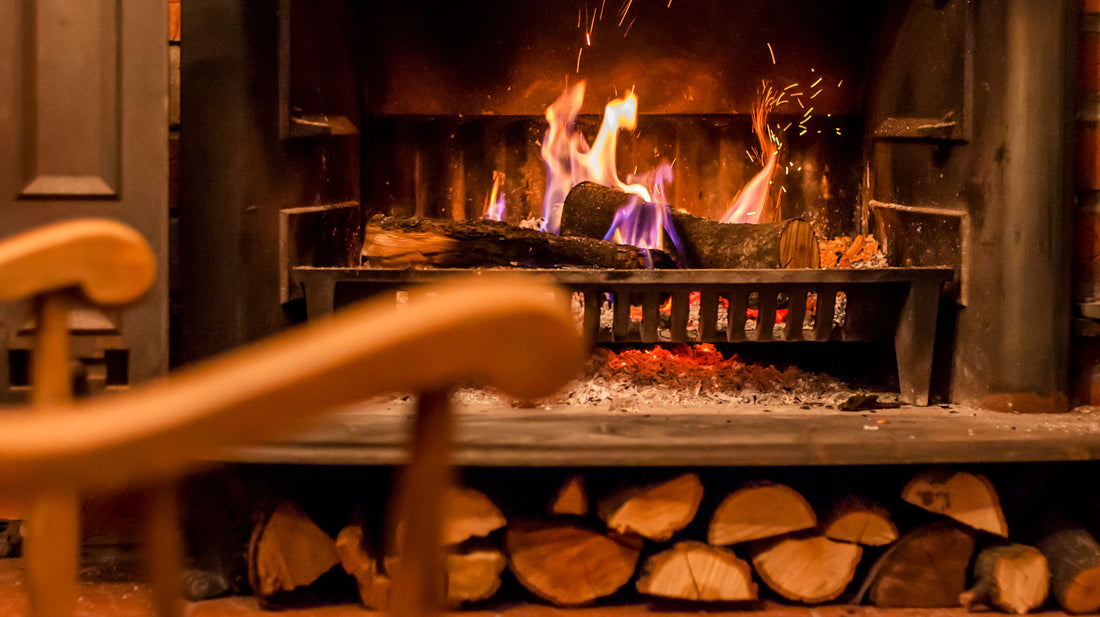
Kiln dried vs. seasoned firewood: what’s the difference?
Share
When it comes to choosing firewood, two popular options are often mentioned: kiln dried firewood and seasoned firewood. Each type has its unique characteristics that can affect your burning experience, heating performance, and even the scent of your home. Understanding these differences can help you make an informed decision about your fireplace or wood stove.
What is kiln dried firewood?
Kiln dried firewood undergoes a special drying process in a controlled environment. The logs are placed in a drying oven where heat and low humidity work together to reduce the moisture content. This method ensures:
- Fast drying : Usually it only takes a few days
- Low moisture content : Normally about 10-18%
- Consistent quality : uniform size and shape

Advantages of kiln dried firewood
Choosing kiln-dried firewood offers several advantages:
- Immediate use : Can be burned immediately
- Higher heat output : Burns hotter due to lower humidity
- Less smoke and soot : Clean combustion reduces the build-up in your chimney
- No bugs and mold : The drying process eliminates pests
Common types of kiln dried firewood
Kiln dried firewood comes from different tree species, each with its own distinctive characteristics. Some popular options include:
- Oak : Dense wood that burns for a long time; ideal for warmth
- Birch : Quick lighting with a pleasant scent
- Hornbeam : Hard wood that burns slowly and provides continuous heat
- Red Oak : Provides excellent warmth but takes longer to dry naturally

What is seasoned firewood?
Seasoned firewood refers to logs that have been cut and dried naturally over an extended period of time. This process typically takes between six months and two years, depending on factors such as:
- Environmental conditions (sunlight, wind, humidity)
- Wood type (hardwood vs. softwood)
Properties of seasoned firewood
Typically, seasoned firewood has:
- Moisture content of 20-30%
- Appearance with cracks in the bark
- Lower weight compared to freshly cut wood
Benefits of seasoned firewood
Seasoned firewood also has its advantages:
- Cost effective : Often cheaper than kiln dried options
- Availability : Widely available from local suppliers
- Natural fragrance : Retains the natural wood smell when burning
Popular types of seasoned firewood
Just like kiln-dried wood, seasoned options come from a variety of tree species. Favorites include:
- Oak : Known for its longevity when burning; good for overnight fires
- Birch : Provides fast flames and bright light for outdoor events
- Hornbeam : Provides excellent heat retention; perfect for long winter nights
Comparison of kiln dried and seasoned firewood
Important considerations
When deciding between these two types of firewood, you should consider the following aspects:
- Moisture content:
- Kiln dried firewood has a significantly lower moisture content, meaning it ignites quickly and burns hotter. This property is particularly beneficial for those looking to maximize heating output.
- Seasoned firewood , although still usable, may have a higher moisture content, which can affect combustion quality if not sufficiently dried.
- Drying time:
- The quick drying process of kiln dried wood makes it a convenient option for immediate use.
- In contrast, seasoned wood requires careful storage for several months or even years to achieve optimal dryness. This longer period allows natural air circulation and promotes better seasoning.
- Usability:
- With kiln dried wood, users can enjoy the convenience of immediate use without having to worry about further drying.
- Seasoned wood may require more attention to ensure it reaches the desired level of dryness before burning, especially in wet weather.
- Cost factors:
- Kiln dried lumber tends to be more expensive due to the controlled drying process and equipment required, which can be a factor for budget-conscious buyers.
- Seasoned wood is generally less expensive, making it an attractive option for regular users who value economy.
- Heat production and efficiency:
- If you want maximum heat production in a short period of time, kiln dried firewood is often the first choice as it burns hotter and more efficiently.
- Seasoned wood provides moderate heat production that can still be effective but may take longer to reach peak temperatures.
- Environmental impacts:
- Kiln drying uses energy in its production process, while seasoned firewood relies on natural aging. Choosing seasoned wood can be attractive to those who prioritize sustainability.
Conclusion
Overall, both kiln-dried and seasoned firewood have their own advantages and considerations. Your specific needs - whether it's instant heat or cost-effectiveness - will influence your choice between these two options.
Choosing the right size
When buying firewood, you should also consider the size of the logs. A standard length is often around 25 cm , which fits comfortably in most fireplaces and stoves.
Why log size is important
Choosing the right log length can improve your burning experience because:
- Proper fit in your stove or fireplace promotes efficient combustion.
- Smaller logs ignite faster and provide instant heat.
- Larger logs burn longer but may require more effort to light.
Storing your firewood
Regardless of whether you choose kiln-dried or seasoned firewood, proper storage is essential to maintain quality.
Tips for storing firewood
- Keep the wood off the ground with pallets or shelves.
- Store it in a dry place with good air circulation.
- Cover the top with a tarp, but leave the sides open for ventilation.
- Avoid stacking too tightly; good air circulation is crucial.
Conclusion
Whether you choose kiln dried or seasoned firewood depends on personal preference, budget and intended use. Both types have their own advantages that suit different needs.
For those who prefer convenience and instant heat, kiln dried options are an excellent solution. Alternatively, seasoned firewood might be the best choice if you are looking for cost-effectiveness and natural flavors.
